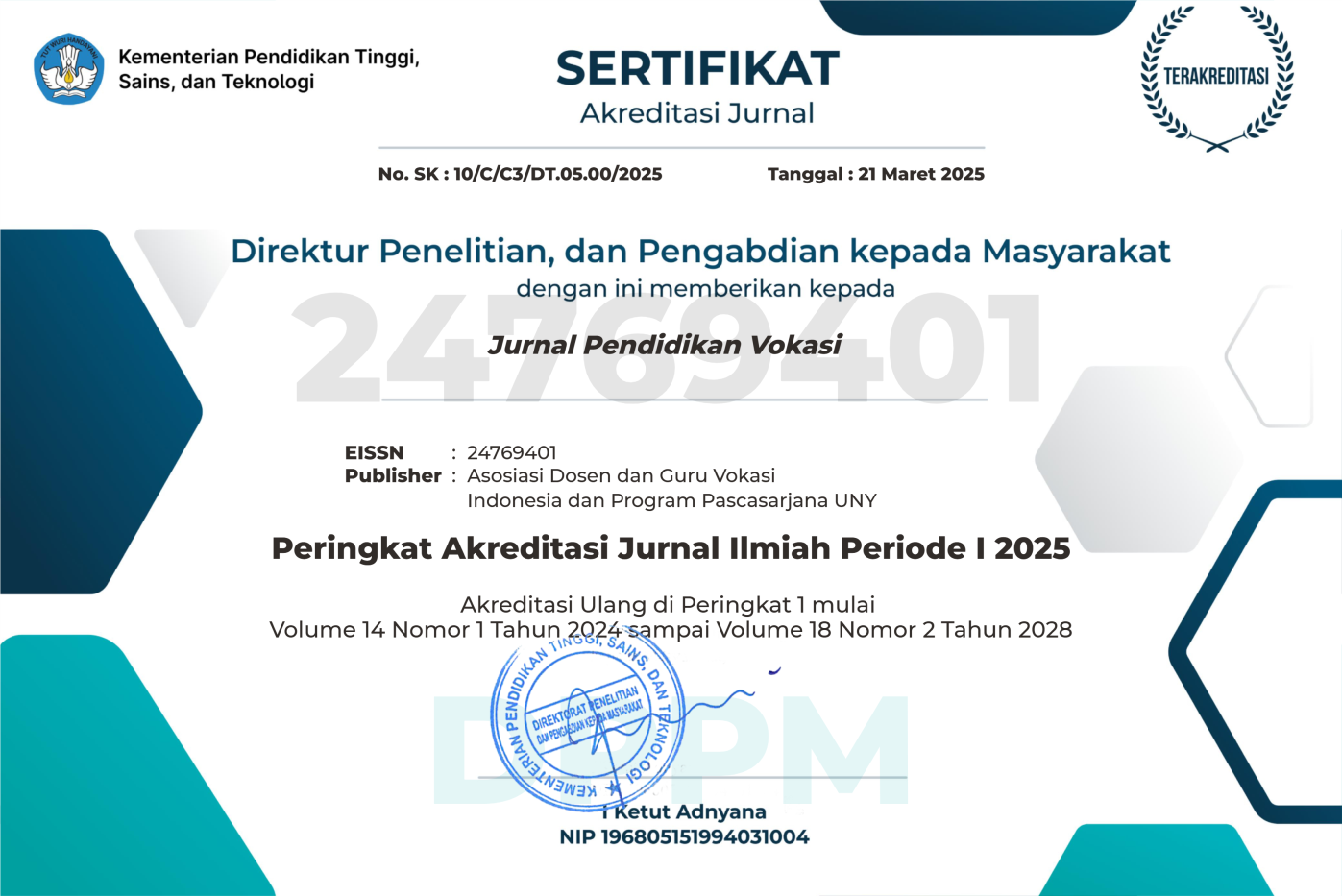The effect of problem-based e-learning content on the learning achievement in basic computer system course (DSK) of the student of informatics engineering education department
DOI:
https://doi.org/10.21831/jpv.v8i1.18098Keywords:
Content e-Learning, problem based learning, basic computer system courseAbstract
This study was aimed at finding out the difference in learning achievement in basic computer system course (DSK) between the students who learned from content e-problem-based learning in experiment class and those who learned from conventional model in control class in learning basic computer system course. This study used quasi-experimental non-equivalent Pretest Post-test Control Group Design. There were three variables involved in this study. Two of them were independent variable and dependent variable. The independent variable was e-problem-based learning and the dependent variable was learning achievement. Another variable which functioned as covariate was students'prior learning achievement. The population consisted of all students of the first semester in Informatics Engineering Education Department. The sample was selected by using simple group random sampling technique. An essay test was used to know the students'basic computer system learning achievement (DSK). The hypothesis was tested by one-way analysis of co-variance (ANACOVA). The results showed that the mean score in the learning achievement of the students who learned from content e-problem-based learning was higher than that of those who learned from using conventional model. Content e-problem-based learning plays the role in improving students' learning achievement.
References
Assriyanto, K. E., Sukardjo, J. S., & Saputro, S. (2014). Pengaruh model pembelajaran berbasis masalah melalui metode eksperimen dan inkuiri terbimbing ditinjau dari kreativitas siswa pada materi larutan penyangga di SMA N 2 Sukoharjo tahun ajaran 2013/2014. Jurnal Pendidikan Kimia, 3(3). Retrieved from http://jurnal.fkip.uns.ac.id/index.php/kimia/article/view/4268
Atmanegara, W. P. (2016). Pengembangan media pembelajaran elearning menggunakan edmodo pada mata pelajaran elektronika dasar studi pada siswa kelas X TEI SMK Negeri 2 Bojonegoro. Jurnal Pendidikan Teknik Elektro, 5(1), 359–364. Retrieved from http://ejournal.unesa.ac.id/article/17942/44/article.pdf
Candiasa, I. M. (2004). Statistik multivariat dilengkapi aplikasi dengan SPSS. Singaraja: Unit Penerbitan IKIP Negeri Singaraja.
Candiasa, I. M. (2006). Program SPSS. (buku ajar, tidak diterbitkan). Singaraja: Jurusan Ilmu Keolahragaan, Undiksha.
Nafiah, Y. N., & Suyanto, W. (2014). Penerapan model problem-based learning untuk meningkatkan keterampilan berpikir kritis dan hasil belajar siswa. Jurnal Pendidikan Vokasi, 4(1). Retrieved from https://journal.uny.ac.id/index.php/jpv/article/view/2540/2098
Raharjo, H., & Soenarto. (2015). Pengaruh metode problem-based learning dan direct teaching terhadap hasil belajar alat ukur. Jurnal Pendidikan Vokasi, 5(2). Retrieved from https://journal.uny.ac.id/index.php/jpv/article/viewFile/6383/5516
Santyasa, I. W. (2011). Pembelajaran inovatif. Buku ajar. Singaraja: Universitas Pendidikan Ganesha.
Sindu, I. G. P., Santyasa, I. W., & Warpala, I. W. S. (2013). Pengaruh model eLearning berbasis masalah dan motivasi belajar terhadap hasil belajar KKPI siswa kelas X di SMK Negeri 2 Singaraja. Jurnal Teknologi Pembelajaran, 3. Retrieved from http://pasca.undiksha.ac.id/ejournal/index.php/jurnal_tp/article/view/617
Sofyan, H., & Komariah, K. (2016). Pembelajaran problem based learning dalam implementasi Kurikulum 2013 di SMK. Jurnal Pendidikan Vokasi, 6(3), 260–271. https://doi.org/10.21831/jpv.v6i3.11275
Sugandi, A. I. (2013). Pengaruh pembelajaran berbasis masalah dengan setting kooperatif Jigsaw terhadap kemandirian belajar siswa SMA. Jurnal Ilmiah Program Studi Matematika STKIP Siliwangi Bandung, 2(2), 144–155. Retrieved from http://www.ejournal.stkipsiliwangi.ac.id/index.php/infinity/article/view/31
Wijaya, M. (2012). Pengembangan model pembelajaran elearning berbasis web dengan prinsip epedagogy dalam meningkatkan hasil belajar. Jurnal Pendidikan Penabur, 19(11), 20–37. Retrieved from http://bpkpenabur.or.id/wp-content/uploads/2015/10/jurnal-No19-Thn11-Desember2012.pdf#page=26
Downloads
Published
How to Cite
Issue
Section
Citation Check
License
The authors submitting a manuscript to this journal agree that, if accepted for publication, copyright publishing of the submission shall be assigned to Jurnal Pendidikan Vokasi. However, even though the journal asks for a copyright transfer, the authors retain (or are granted back) significant scholarly rights.
The copyright transfer agreement form can be downloaded here: [JPV Copyright Transfer Agreement Form]
The copyright form should be signed originally and sent to the Editorial Office through email to jpvokasi@uny.ac.id
Jurnal Pendidikan Vokasi by http://journal.uny.ac.id/index.php/jpv is licensed under a Creative Commons Attribution-ShareAlike 4.0 International License.












